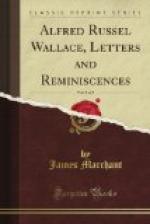My dear Wallace,—My return from a short holiday at Sidmouth last Thursday was greeted by your kind and welcome letter and copy of your “Life.” The latter was, I assure you, never expected, knowing as I do the demand for free copies that such a work inflicts on the writer. In fact I had put it down as one of the annual Christmas gifts of books that I receive from my own family. Coming, as it thus did, quite unexpectedly, it is doubly welcome, and I do heartily thank you for this proof of your greatly valued friendship. It will prove to be one of four works of greatest interest to me of any published since Darwin’s “Origin,” the others being Waddell’s “Lhasa,” Scott’s “Antarctic Voyage,” and Mill’s “Siege of the South Pole.”
I have not seen Clodd’s edition of Bates’s “Amazon,” which I have put down as to be got, and I had no idea that I should have appeared in it. Your citation of my letters and their contents are like dreams to me; but to tell you the truth, I am getting dull of memory as well as of hearing, and what is worse, in reading: what goes in at one eye goes out at the other. So I am getting to realise Darwin’s consolation of old age, that it absolves me from being expected to know, remember, or reason upon new facts and discoveries. And this must apply to your query as to anyone having as yet answered de Vries. I cannot remember having seen any answer; only criticisms of a discontinuous sort. I cannot for a moment entertain the idea that Darwin ever assented to the proposition that new species have always been produced from mutation and never through normal variability. Possibly there is some quibble on the definition of mutation or of variation. The Americans are prone to believe any new things, witness their swallowing the thornless cactus produced by that man in California—I forget his name—which Kew exposed by asking for specimens to exhibit in the Cactus House....—I am, my dear Wallace, sincerely yours,
JOS. D. HOOKER.
* * * * *
TO MR. E. SMEDLEY
Broadstone, Wimborne. January 31, 1906.
Dear Mr. Smedley,—I have read Oliver Lodge’s book in answer to Haeckel, but I do not think it very well done or at all clearly written or well argued. A book[32] has been sent me, however, which is a masterpiece of clearness and sound reasoning on such difficult questions, and is a far more crushing reply to Haeckel than O. Lodge’s. I therefore send you a copy, and feel sure you will enjoy it. It is a stiff piece of reasoning, and wants close attention and careful thought, but I think you will be able to appreciate it. In my opinion it comes as near to an intelligible solution of these great problems of the Universe as we are likely to get while on earth. It is a book to read and think over, and read again. It is a masterpiece....—Yours very truly,
ALFRED R. WALLACE.




